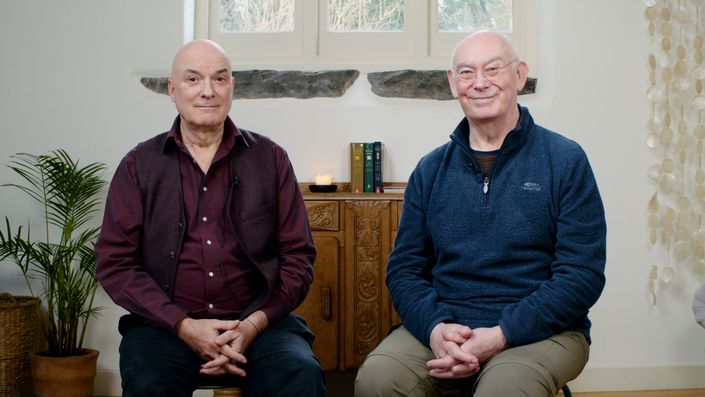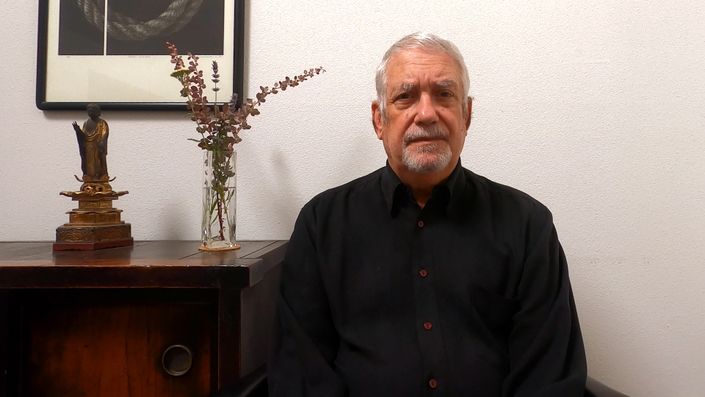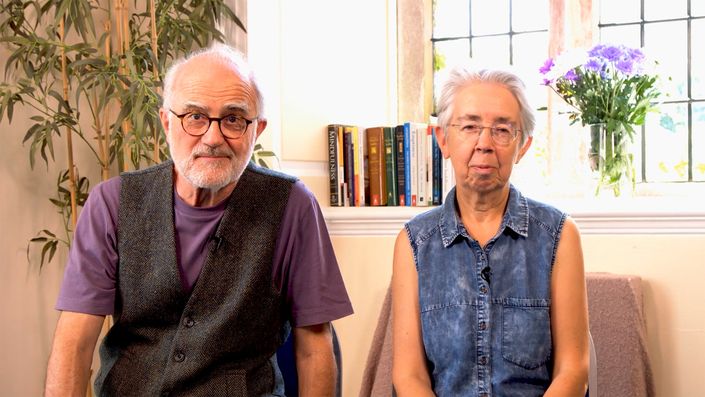The Seven Universal Virtues
How to Flourish in Life
with Seth Zuihō Segall
Contemplate the wisdom of the Buddha, Confucius, and Aristotle to develop seven qualities that will enrich your life.
The Virtues
There is a lot of cross-cultural agreement on what is ultimately important in life. These seven virtues are held in common by the traditions of the Buddha, Confucius, and Aristotle alike.
At a time when anxiety and depression are epidemic and civic life is corrupted by injustice, conflict, and distrust, an understanding of the virtues has never been more important.
—Seth Zuihō Segall
Enroll today
This easy-to-use online course is an eight-week program of instruction, discussion, meditation, and inquiry. Each unit contains around 45 minutes of material to study, as well as contemplative exercises. After the course begins, a new unit will be released each Monday. You are free to study at your own pace, and will retain ongoing access to the material.
You can follow the course on a computer, tablet, or phone.
Conversations with Key Thinkers
This course includes exclusive conversations between Seth and seven key thinkers on these virtues and the role they can play in healing our lives and our world.

Sharon Salzberg on Benevolence
Hear Sharon chat with Seth about benevolence and lovingkindness, and the importance of goodwill in challenging times.

Polly Young-Eisendrath on Truthfulness
Seth talks with Polly, a psychologist and author, about the social benefits of being honest, and how our ideas about truth and falsehood develop from childhood to maturity.

Jack Petranker on Justice
Seth and Jack—an author, thinker, and lawyer—talk about the virtue of justice and its importance for social harmony.

Stephen Batchelor on Courage
Stephen Batchelor is an author and thinker. Here, he speaks to Seth about courage: the courage to love, to be, and to grow. This is a virtue that enables many others.

Amod Sandhya Lele on Temperance
Amod is a philosopher and writer who draws on many intellectual and spiritual traditions to make sense of the world. Here, he talks to Seth about the quality of temperance, a virtue we perhaps overlook these days.

Tenku Ruff Osho on Equanimity
Tenku Ruff Osho is an ordained priest in the Sōtō Zen tradition. Tenku explains to Seth that, for her, equanimity is the ability to bow to the Buddhanature in all beings.

Belinda Siew Luan Khong on Conscientiousness
Belinda Siew Luan Khong is a psychologist and children's author. She speaks with Seth about the importance of being responsible, diligent, and reliable, of taking our commitments to others seriously.
The ABC of Ancient Wisdom
This course distills the wisdom of three major figures: Aristotle, the Buddha, and Confucius. These are three startlingly original thinkers from geographically distinct cultures—who nevertheless agreed that good lives are those that cultivate virtue and wisdom through practice and study.

Aristotle
Aristotle (384-322 BCE) believed good lives cultivate a set of moral and intellectual virtues and thought of these virtues as midpoints between behavioral excesses and deficiencies. For Aristotle, ethics was not about following ironclad rules but about developing the right sort of character.

The Buddha
The Buddha (c. 563-483 BCE) taught on the Indian subcontinent for 40 years following his enlightenment experience. His teachings on mindfulness, compassion, and lovingkindness are a major influence on contemporary Western psychology.

Confucius
Confucius (551-479 BCE) lived at a time when China had devolved into a set of squabbling dukedoms plagued by chaos, war, poverty, poverty, and hunger. Confucius was interested in how to restore peace, harmony, tranquility, and prosperity so that people could flourish.
Features and Benefits

An expert guide
Seth Zuihō Segall is a Zen Buddhist priest who, for many years, taught a course at SUNY on what the Buddha, Aristotle, and contemporary psychology can tell us about the good life. Then Seth began to study Chinese language and philosophy, coming to appreciate Confucianism as a path to flourishing.

30+ inspiring videos
The course features a wealth of talks, guided contemplations, and conversations to bring the seven universal virtues fully into your life. The program offers around 6 hours of carefully planned video material.

Stimulating conversations
Seth has called on seven contemporary thinkers to help him explore each of the universal virtues. These conversations offer a range of perspectives and voices, from a philosopher to a Buddhist priest, to psychologists and writers.

No prior knowledge needed
You don't have to know anything about Aristotle or Confucius to take this course. This is a practical exploration of key virtues and how we can manifest them in our attitude and behavior. Any knowledge needed will be supplied and any philosophical terms will be explained.

Take the course with you
You don't need to be sitting at a computer to take this course. You can use a tablet or phone, or even download the audio files or a printable workbook, and head off into nature or to a café.

Enrich your life
There is so much wisdom in the teachings of Aristotle, Buddha, and Confucius. This course will give you the ideas and tools that lead to deeper relationships, a wise and peaceful heart, and a rewarding and meaningful life.

Meet Seth
Seth Zuihō Segall, Ph.D. is a Zen Buddhist priest and clinical psychologist who is the science writer for the Mindfulness Research Monthly, a contributing editor to Tricycle: The Buddhist Review, and leads Pamsula Zen of Westchester.
Seth has practiced Buddhism for over a quarter century. Since 2010, he has practiced in the White Plum Zen lineage receiving shukke tokudo (clerical ordination) in 2016 under the preceptorship of Daiken Nelson Roshi.
He is the author of The House We Live In: Virtue, Wisdom and Flourishing (2023), Buddhism and Human Flourishing: A Modern Western Perspective (2020), Living Zen: A Practical Guide to a Peaceful, Positive, and Balanced Life (2020), and Encountering Buddhism: Western Psychology and Buddhist Teachings (2003).
Testimonials
Praise for The House We Live In: Virtue, Wisdom, and Pluralism
It would hardly be an exaggeration to call this brilliant and beautiful book one of the most important works of our time. In my view, it should certainly rank as one of the wisest. Looking deeply into today’s social, cultural, and political crises, the author points to the compelling need to re-envision the perennial moral and intellectual virtues as the indispensable key to human flourishing in both the personal and communal dimensions of our lives. His close and careful analysis of these virtues, and their connection with wellbeing, shows us what we must do to emerge intact from the confusion and conflicts of our age.—Ven. Bhikkhu Bodhi
Through a rich and rigorous synthesis of flourishing-based ethical perspectives, Seth Zuihō Segall offers insights and inspiration from religious and secular traditions both past and present. To address our increasingly global crisis, we urgently need the kind of globally informed ethics that this book provides.—Stephen Batchelor
Praise for Buddhism and Human Flourishing: A Modern Western Perspective
Seth Zuihō Segall is one of a kind: a Zen Buddhist priest, a hospital chaplain associate, psychotherapist, existentialist, peace activist, and as fluent in recent philosophical debates about the nature of self and consciousness as in the history and philosophy of Buddhism. In this timely, crystal clear book, Segall defends a version of Buddhism modernism attuned to the sensibilities of secular and scientifically minded people. How can people in the lineage of Plato and Aristotle and the Abrahamic traditions adapt and adopt Buddhist beliefs and sensibilities? In this terrific book, Seth Segall shows a way.—Owen Flanagan
Buddhism and Human Flourishing is an admirably thoughtful work of comparative practical philosophy and psychology. It is one of the few books from a modern Buddhist perspective that grapples with the realities of historical and cultural context and with what it means to take up ideas and practices from a very different time and place with nuance and complexity. A rare fusion of erudition and accessibility, it will be of interest to scholars and practitioners alike.—David McMahan
Challenging traditional understandings of rebirth and karma is a hallmark of all emerging modernist Buddhisms. If they’re right, then one question burns: what is enlightenment? Seth Zuihō Segall, Zen priest and psychologist, explores how Aristotle’s eudaimonia may prove the key to a modernist Buddhist path of awakening. This is a compelling book, challenging but also inviting. It’s an important contribution to a growing modernist Buddhist literature. I recommend it to anyone wrestling with the great questions of who are we and how can we live lives of value and meaning.—James Ishmael Ford
Contemporary Western Buddhism has become a process, not of the extinction of the self and desire, but of their transformation in the service of human flourishing. Seth Zuihō Segall, with a creative synthesis of contemporary psychology and Aristotelean virtue ethics, has formulated a new "eudaemonic Buddhism" that is both relevant to our times, while preserving the essential teachings of traditional Buddhism.—Barry Magid
How the Journey Unfolds
Course Curriculum
A detailed overview of The Seven Universal Virtues. Click the arrow below to see the full program.
Related Courses
You may also be interested in these online courses from Tricycle: The Buddhist Review.





